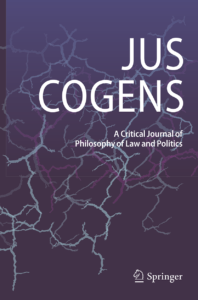Vorbild mit Nachbesserungsbedarf
Durch den Entwurf der Berliner Justizsenatorin zur verfassungsrechtlichen Absicherung des Verfassungsgerichtshofs soll dieser resilienter gemacht werden. Er greift Sorgen auf, die intensiv in der Fachöffentlichkeit diskutiert werden und reiht sich ein in Resilienzinitiativen anderer Bundesländer. Dabei macht er viel richtig, ist an einigen Stellen aber auch nachbesserungsbedürftig: Es fehlt ein Ersatzwahlmechanismus für den Fall einer Sperrminorität und auch im Haushaltsverfahren sollte das Gericht noch gestärkt werden.
Continue reading >>Avantgarde der Geschlechtervielfalt
Der österreichische Verfassungsgerichtshof hat kürzlich mit einem Erkenntnis zur rechtlichen Anerkennung der individuellen Geschlechtsidentität aufhorchen lassen. Darin klärt das Gericht eine zentrale Frage: ob auch Personen, die sich zwischen den Geschlechtern identifizieren, aber keine somatische Intergeschlechtlichkeit aufweisen, einen eigenen Geschlechtseintrag – wie inter und divers – erlangen oder diesen ganz streichen lassen können. Aufgrund des neuen Erkenntnisses ist dies nun möglich. Der VfGH krönt seine Judikatur zur Geschlechtervielfalt mit einem klaren Bekenntnis zur individuellen Entfaltung der Geschlechtsidentität, die durch das Grundrecht auf Privatleben geschützt ist.
Continue reading >>Text Is Not Enough
Advocate General Ćapeta’s Opinion in Case C-225/24, of 12 February 2026, clarifies that, in contexts of systemic rule-of-law deterioration, compliance cannot be measured solely by legislative text, while also explaining the constraints of discretionary power in EU fund cases. Rule-of-law compliance must be assessed through effective implementation and attention to the broader constitutional environment. The Opinion articulates an evaluative logic for EU rule-of-law governance that is particularly significant in backsliding settings and foreshadows the standards required for constitutional reconstruction after illiberal rule.
Continue reading >>We Own It, So We Can Break It
Standing next to Volodymyr Zelensky days before the Nicolás Maduro extraction, Donald Trump asserted, “we’re protected by a thing called the Atlantic Ocean.” His statement sounded at once naïve and antiquarian in a globalized world of cyberattacks and US worldwide presence. But it is part of the hemispheric charge moving his National Security Strategy 2025 away from the China-centric anxieties. The NSS provides keys to other elements of the administration’s foreign policy, including relations with China, Russia, and Europe; recovery of dusty spheres-of-influence and balance-of-power talk; and the focus on “Western civilization”.
Continue reading >>Remedies as the Real Test in The Gambia v Myanmar
The merits hearings in Application of the Genocide Convention (The Gambia v Myanmar) concluded on 29 January 2026, and the Court has entered deliberations, with the judgment date to be announced later. Commentary on this case understandably gravitates to proof, genocidal intent, and whether the ICJ will repeat the caution of its earlier genocide judgments. Those issues matter, but they can obscure a harder question: what does the Court think a genocide judgment is for? The answer is not found in abstract debates about enforceability. It is embedded in remedies.
Continue reading >>Has the European Parliament Shot Itself in the Foot?
After 25 years of negotiations, on 6 December 2024, the EU and four Mercosur countries – Argentina, Brazil, Paraguay, and Uruguay – reached an EU-Mercosur Agreement. The geoeconomic importance of this Agreement cannot be understated. Against this background, it came as a surprise when a narrow majority in the EP, backed by far-right and far-left parties alike, on 21 January 2026, requested an opinion on its compatibility with EU law. By contesting the legality of the Agreement, the EP risks losing a formal say over the temporal application of the “trade part” of broader mixed agreements pending ratification in the Member States.
Continue reading >>Soft Law in Hard Times
Seasoned court watchers were no doubt surprised by the English High Court’s decision to overturn the British Home Secretary’s decision to proscribe Palestine Action. For anybody even casually familiar with British courts’ approach to national security-related matters, the odds of success were not good. The judgment is certainly not a slam-dunk victory for Palestine Action and it is replete with extensive discussion condemning the actions of the group. And yet despite these admonishments, the judgment intimates at wider concerns as to the role of counter-terrorism legislation in liberal democracies
Continue reading >>High Thresholds and Wide Margins
The European Court of Human Rights (ECtHR) issued an inadmissibility declaration in the climate case of Fliegenschnee and Others v. Austria. While an unsuccessful outcome was expected, the decision nevertheless clarifies three aspects of the Court’s climate jurisprudence. Taken together, the case shows that the Court neither demanded more than in previous cases nor reneged on its requirements as laid down in Verein KlimaSeniorinnen Schweiz and Others v. Switzerland.
Continue reading >>Nationalization Nonsense
Fueled by resentment, xenophobia, and, one can assume, a growing awareness of his party’s diminishing prospects in the upcoming midterms, President Trump recently suggested that his party “nationalize” elections. As every expert to have weighed in on the matter has noted, the claim is preposterous. Simply put, the President has no direct authority over elections. While there are legitimate fears about Trump’s willingness to interfere with this Fall’s elections, he has no power to assume the control he desires.
Continue reading >>Peace by Chairman
Das Board of Peace, gegründet am Rande des Weltwirtschaftsforums in Davos, inszeniert sich als pragmatischer Gegenentwurf zu den Vereinten Nationen. 60 Staaten wurden zur Mitarbeit eingeladen, 21 erklärten ihre Bereitschaft zum Beitritt. In Europa überwog jedoch die Skepsis. In Deutschland ist diese Skepsis auch verfassungsrechtlich begründet: Das Board weist institutionelle Defizite auf, konzentriert Entscheidungsbefugnisse und ist nicht hinreichend an die Mitgliedstaaten rückgebunden.
Continue reading >>CURRENT DEBATES
Reflexive Globalisation and the Law
In October 2025, a new Centre for Advanced Studies was established at the Humboldt University of Berlin’s Law Faculty. Named “Reflexive Globalisation and the Law: Colonial Legacies and their Implications in the 21st Century” (RefLex), the Centre explores the premise that the globalisation of law and legal discourse has entered a reflexive phase: one in which law and knowledge production about law are less and less one-directional exports from or within the Global North but rather dynamic, multidirectional exchanges that confront colonial legacies, epistemic hierarchies, and enduring asymmetries of power. This blog symposium, co-edited by Philipp Dann, Florian Jeßberger, and Kalika Mehta, aims to present and extend these interactions to a broader, accessible dialogue with a wider community beyond the university setting. Featuring contributions from a range of different disciplines and regions, the symposium serves as a public prelude to its official launch, which can be watched live here.
Read all articles >>Wem gehört die Wissenschaft?
Wem gehört die Wissenschaft – und wem sollte sie gehören? Obwohl Wissen als öffentliches Gut prinzipiell unbegrenzt teilbar ist, wird der Zugang zu wissenschaftlichen Publikationen und Infrastrukturen durch ökonomische und rechtliche Strukturen beschränkt. Zwischen kommerziellen Verlagsmodellen, staatlicher Finanzierung und Community-getragenen Open-Access-Initiativen stellen sich grundlegende Fragen nach Eigentum, Verantwortung und Unabhängigkeit wissenschaftlicher Arbeit. Das Blog-Symposium „Wem gehört die Wissenschaft?“ greift diese Frage auf und beleuchtet Facetten der Organisation von Wissenschaft als Gemeingut, der Eigentums- und Machtverhältnisse im Publikationssystem und der Bedingungen offener und freier Wissensproduktion.
Read all articles >>ADVERTISEMENT
 Volume 7,
Volume 7,Issue 2
July 2025
JUS COGENS
-
Killing Hitler Word by Word: The Oath as Apocalyptic Lawmaking
GREGOR NOLL
-
Adjudicating Climate Protest as a Tool of Modern Republicanism
DMITRII KUZNETSOV
OUR LATEST PUBLICATION
Maria Antonia Tigre, Maxim Bönnemann & Antoine De Spiegeleir (eds.)
The ICJ’s Advisory Opinion on Climate Change
The International Court of Justice’s Advisory Opinion on Obligations of States in Respect of Climate Change marks the most consequential development in international climate law since the adoption of the Paris Agreement. Bringing together leading scholars and practitioners from across the globe, this book offers the first comprehensive and critical examination of the opinion, exploring its doctrinal foundations, normative implications, and potential to reshape global climate governance.
Discover the Open Access digital edition here.
PROJECTS
VB Security and Crime
In cooperation with:
VB Security and Crime is a cooperation of the Max Planck Institute for the Study of Crime, Security and Law (MPI-CSL) and the Verfassungsblog in the areas of public security law and criminal law. The MPI-CSL Institute is a member of the Max Planck Law network.
Das Justiz-Projekt

Weltweit gerät die unabhängige und unparteiische Justiz unter den Druck des autoritären Populismus.
Wie verwundbar ist die rechtsprechende Gewalt in Deutschland – im Bund und in den Ländern?
VB Security and Crime
In cooperation with:
VB Security and Crime is a cooperation of the Max Planck Institute for the Study of Crime, Security and Law (MPI-CSL) and the Verfassungsblog in the areas of public security law and criminal law. The MPI-CSL Institute is a member of the Max Planck Law network.
EDITORIAL
Drawing Red Lines
Lately, there has been much talk of “red lines” in German politics. Take, for instance, the recent recommendations of the conservative think tank Republik21 on how to deal with the so-called “New Right”, according to which the “Brandmauer” policy of strict exclusion of the AfD should be replaced with differentiated red lines. CDU and CSU should in future determine their course on the basis of what is “constitutionally permissible” and
Continue reading >>Rote Linien ziehen
Neuerdings ist viel von „roten Linien“ die Rede. So empfiehlt etwa die konservative Denkfabrik Republik21 der sogenannten bürgerlichen Politik, für den Umgang mit sogenannten neuen Rechten „rote Linien“ zu ziehen statt „Brandmauern“ zu bauen. Deren Verlauf sollten CDU und CSU künftig anhand des „verfassungsrechtlich Zulässigen“ sowie des „politisch Zustimmungsfähigen“ ermitteln. Mit anderen Worten: Die Frage, was beim Bilden von Mehrheiten mit der AfD als rote Linie gilt, wo sie verläuft
Continue reading >>



